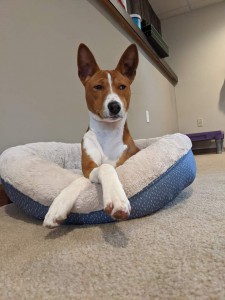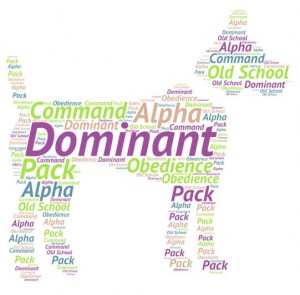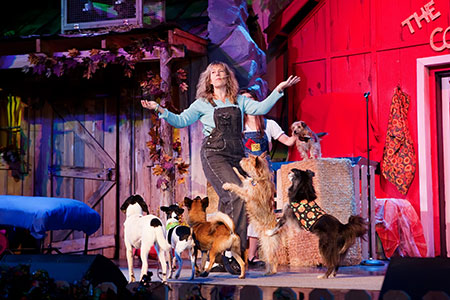Beyond the Myths: Facts Over Fiction
Dog trainers who have been working at their craft for a long time are generally very skilled in holding their tongues about the myriad of things that they hear when working with clients or even when out in dog centered locales, overhearing the general dog loving public. The source of these outdated myths are usually well-meaning family and friends trying to “help” the dog parent. But sadly, in far too many cases, the source is sometimes people actually working as “trainers”, who haven’t updated their dog behavior education in a very long time. And then of course, there is “the internet”, a source of both truth and fiction alike. I am here to bust some of those myths up with facts. Get comfortable!
Humans should eat before dogs to establish dominance:
No, just no. This came from some outdated idea that alpha wolves eat first. In reality, wolf families share meals and in times of scarcity, they make sure that the pups are fed first. In a human run household with dogs, regardless of their age, the dogs are the pups. Feeding them first will not cause them to believe that they are dominant. It will make mealtimes for the humans much more pleasant as the dogs will not be annoying the humans while they eat, as they are already satisfied. I generally recommend to my clients that they plan both meals to be ready at the same time so that they can offer the dogs their meal as they are about to sit down to their own meal. Win/win.
More on that here: Pack leadership is not a thing!
More dominance nonsense. Dogs like cushy places like couches and human beds because they are exactly that, cushy places. They have no illusions of control being on such cushy places except if they are resource guarding such spaces. This is not dominance related at all. It’s a behavioral issue that can be somewhat hardwired in as a survival instinct, but can successfully be worked with to improve those nerve patterns. So, if your dog resource guards raised surfaces from either the humans or other animals in your household, then get yourself a quality modern methods rewards-based behavior consultant so that you can resolve that issue the right way. In the meantime, provide plenty of soft surfaces for all dogs at floor levels. Read Sleeping with your dog has benefits! for how it improves the relationship to have your dogs sleep with/near you. Additionally, in a similar context, you can safely sit on the floor with your dog without them thinking that you are now a sibling/toy. But do realize that many dogs are soooo excited to have their humans on the floor with them that those who have not developed great impulse control skills yet will be super excited and possibly be all over you. This does not translate to “being dominant”. This translates similarly to being on the floor with an excited toddler. Adjust your expectations accordingly.
Dogs should never walk in front of a human:
That’s silly at best. Personally, I want my dogs walking in front of me on walks, as I hate the feeling of the leash slapping at my legs. “Heeling” is an outdated concept better practiced in competition “obedience”. If you aren’t doing such, then just worry about leash manners versus heeling. Will you need your dogs to walk by your side briefly in certain contexts? Absolutely! Two examples: you have a large dog and there are others headed your way and you need to give them space; you are walking into the vet’s or the groomer’s facility, and you want to maintain control in case someone else isn’t doing so. Both of these are perfectly acceptable reasons for “heeling”. But I don’t call it that and I teach it as a “stay with me” type of scenario that a dog is lavishly rewarded for and cued for in advance of need and then released as soon as safe to do so. “Heeling” on leash on a walk is B.O.R.I.N.G. for your dog. The walk is for your dog. Let them explore their environment and check their pee-mail as well as “read the landscaping” for critter activity. This is far more mentally tiring than walking in a military style protocol by your side will ever be. Tiring your dog out mentally so that they will be more relaxed at home is your goal with walks, right? Didn’t you ever wonder why your dog returns from a “heeling” walk just as amped up as when you left? Well, now you have your answer. Read both of the following for what a quality walk consists of: Your dog needs walks for enrichment purposes and How to mix up your dog’s walks
Humans should go out of doorways first:
Same theory though not as militantly expressed. Generally, as long as you cue your dogs to exit said doorway/vehicle opening, it’s all good. The key is the cue. Teaching your dogs some impulse control so that bad things don’t happen because of excited exits is the goal here, not some outdated theory that your dogs see you as “alpha” if you go through that doorway first. Dogs don’t think in those terms. They just think you want out more than they do. Personally, I find it easier to exit after them, as long as I am sure that the coast is clear. Obviously, exiting after them applies to doorways, not vehicles. Practicality and all.
Alpha Rolls, just don’t:
This seems to be a thing that just won’t die with some “professionals” insisting that this places you in a “dominant” position. No, it doesn’t. Wolves in the wild never did this. It was disproved decades ago. Read here: Alpha rolls are dumb . Dogs will voluntarily roll on their backs when other dogs scare them or to appear non-threatening when trying to make friends. That is a gesture that means “please don’t hurt me” or “I won’t hurt you”, the first often referred to by trainers in the know, as a tap out. Tossing a dog on his or her back with force or at all, just causes the dog to think that you are unpredictable and not to be trusted. Is that the kind of relationship that you want to forge?
Some breeds need a heavier hand:
No, not at all. All sentient beings learn by both classical and operant conditioning as well as observation. How you implement modern rewards-based methods will differ with each individual dog. But all dogs can be trained/have their behavior modified without a “heavy hand”. Read these for more on this subject: No breed needs a firmer hand and Each dog (not breed) is an individual and also Positive training works on all dogs .
Pack hierarchy is a thing:
Don’t allow anyone to tell you to reinforce a mythical status of one of the dogs in your household. You are the parent in this equation. None of the dogs are “in charge”. The humans set boundaries and enforce safety protocols. The dogs don’t decide who does what, any more than you would allow your children to decide “status” in your home. Be a benevolent parent. Fairness is important, as is making sure that all dogs know that the adult humans in the home are the ones who provide safety. Read more on that here You do not have a pack! and here Dogs notice fairness and here How to effectively parent your crew!
Now go forth and educate your fellow dog parents who might be listening to the wrong crowd please. Their dogs will forever thank you for busting those myths!
Posted in: Projects
Leave a Comment (1) →






